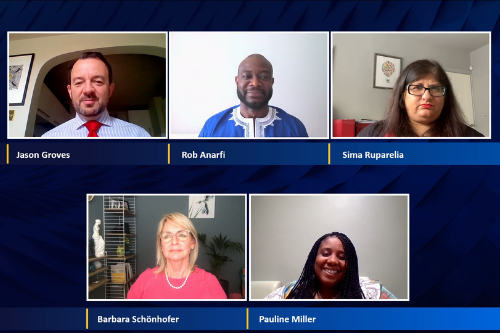

How important is it for the future of the insurance industry to embrace diverse talent? This was the question posed to attendees at BIBA’s recent seminar on ‘Equality, diversity and inclusion’, a discussion chaired by none other than Jason Groves, global director of media relations at Marsh and chair of Dive In. An audience poll found that 72% of respondents said it is “extremely important” and 24% that it is “important”, with only a smattering of votes for anything less than that.
Lending her thoughts on these figures, Sima Ruparelia, chief actuary, UK, Europe and Global Specialty at AIG noted that having been in the industry 20 years, she has seen for herself the change in conversation. Even just in the last two or three years, she said, this rate of change has been on an exponential level compared to that seen previously.
“And I definitely have hope for the future,” she said, “ but I think one of the most important things is some action. We’re having a lot of discussions… but we need courage from our leaders, as well as courage from people who are willing to stand up and say, ‘I am different, and I am going to respond differently. And it’s OK.’
“What I’ve noticed in organisations, in particular, is even training courses [etc] are tailored to make us behave in a way that is the way our current leadership teams behave. And obviously, if we do that, then we’re trying to mould people who are different into becoming the same as everyone else. And that’s going to defeat the purpose.”
What companies, therefore, need to do is rethink these kinds of courses and rethink their recruitment strategies and rewire these structures to let people be different. Ruparelia highlighted that this an important part of the diversity and inclusion agenda because, if it isn’t addressed then insurance businesses will end up with people who have had to conform.
“I have to say,” she said, “I’ve had to conform because you have to conform a bit to get where I am, you have to be resilient, and you have to conform and you have to overlook things. You have to find that courage to have your voice heard, otherwise, it wouldn’t have been heard. But that’s really difficult. And it shouldn’t be that difficult for people coming up [after me].”
Making things easier for people entering the insurance industry is a key component of what Pauline Miller does as head of culture at Lloyd’s, a marketplace that has seen significant cultural disruption in recent years. Looking at the work that she and her team have done, Miller noted that it was a case of knocking at an open door. The challenge was put in front of Lloyd’s and it had to respond as quickly as possible, she said, and the chosen approach was to be firm and fast, with a very clear cultural proposition.
“There’s a great saying from Peter Drucker, which is that ‘culture eats strategy for breakfast’,” she said. “What we’ve tried to do is we’ve taken what has been an ongoing dialogue [about] diversity and inclusion. Yes, about the business case for diversity and inclusion… but actually what we’ve needed to do is make it relevant for us, and for our business and for our people.”
The journey that Lloyd’s has taken over the last two years is one centred around examining how the organisation can ensure that it is making the right decisions based on data, based on facts and based on its understanding of the actual lived experience of its colleagues in the market. Miller stated that this has been about establishing very clear and tangible actions.
Lloyd’s has also taken the step of setting up a cultural advisory group which enables the team to bring outside experience in, she said, and several members within that group are from outside of the insurance industry but are experts in their field. These are working alongside internal leaders to make sure that that the organisation is bringing both the realism of what is right for the insurance sector and the Lloyd’s market alongside the wider external environment, with these experts able to advise Lloyd’s on how to apply what it has learnt and move forward.
“From a business case perspective, what we really need to do is think about why it’s relevant for us in our industry,” she said. “So is it the fact that we are being faced with digital transformation, and increasing regulatory pressure, which means that we have to think about how we do our business? Is it [to do] with product development, or thinking about where emerging risks are coming from - we really need to think about why diversity is important for us.
“So, we have to keep making the business case [as] in my experience around D&I and culture, the more relevant you can make it for the business and the more relevant you can make it for individual people, the more impactful it will be.”
